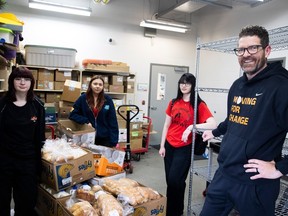New initiatives in the plan will be focused on activating the mâmawêyatitân centre “to its full potential” as a community hub in North Central.

Article content
A job board in the foyer of the mâmawêyatitân centre in Regina is getting plenty of foot traffic lately.
Brian Lewis, the coordinator on the other side of those job postings, is hoping it will see even more by year’s end thanks to a major injection of funding from the City of Regina.
Article content
“This is opening up more doors in a more sustained approach and not just a Band-Aid solution,” he said.
Advertisement 2
Article content
Lewis coordinates Growing Young Movers (GYM), a non-profit organization that operates inside the centre to facilitate youth-led connections through employment, mentorship and after-school programming for all ages.
It’s one of several partners set to receive a slice of $2.9 million in federal funding given to Regina by the Building Safer Communities Fund, an anti-gun and gang violence prevention initiative from Public Safety Canada.
Lewis has big plans to use the funding to expand its employment pathway for Scott Collegiate high school students as well as after-school programming for elementary students later into the evenings and into weekends.
GYM currently has about 40 students on payroll, in various jobs. Lewis hopes to see that number hit 100 in the next year.
And the jobs that GYM can offer are endless, said Lewis. Repairing bikes, taking care of Scott Collegiate’s community garden, sorting food donations and handing them out, joining community cleanups — it’s all already happening.
“Simply paying kids like this, it tells them that they’re important and they have skills and abilities that are needed,” he said. “I don’t think people understand how big of an effect that is.”
Article content
Advertisement 3
Article content
Plans for the full $2.9 million are laid out in a Centering Youth plan, which is headed up by Dr. Merelda Fiddler-Potter. It was developed last spring in extensive consultation with local youth, community-based service providers and Indigenous elders.
Her report, presented to executive committee this past week, says the biggest gaps are a lack of safe spaces to hang out after 5 p.m. and little offered for kids ages 7 to 12.
People often join gangs to feel safe, for an identity or because it’s the sole avenue available to make money, or because they have a family member or peer that’s involved, she said.
Police estimate there’s as many as 10 street gangs operating in Regina, with membership among them as young as 12 years old.
A 2017 survey of middle-school students in Regina revealed that 20 per cent — one in five — have a family member involved in gang life.
“We think the more opportunities they have to see the potential for what they can do, that changes things,” Fiddler-Potter said at Wednesday’s meeting.
In tandem with GYM, Regina Treaty / Status Indian Service (RT/SIS) will also be given funding to offer wrap-around support services, like mental health or housing aid, out of the mâmawêyatitân centre.
Advertisement 4
Article content
Elders will also be made available at the centre, as will other ways for youth to delve into Indigenous culture. The city has already engaged to name a permanent ceremony space east of the city.
Creating a 24-hour safe place for youth in the city is also in the works, though not yet fully worked out, said city administration.
All these initiatives will “activate the mâmawêyatitân centre to its full potential” as a community hub, said Lewis.
“It’s an unbelievable building (and) the theory has always been great, but we need more people here at more times,” he said. “There’s a lot of good things that are here in it already, but we can do more.”
The City of Regina’s role will be oversight, through Community and Social Impact Regina (CSIR). A coordinator will be hired and a measurable framework will be created to keep tabs on the goals of the overall plan.
North Central Strong, a recently formed youth committee, and an Elders Advisory will also be continually involved.
Funding will end in 2026, when the federal program concludes. Lewis said he hopes the city will be paying close attention to what happens between then and now, and the impact this has on the community.
Article content



